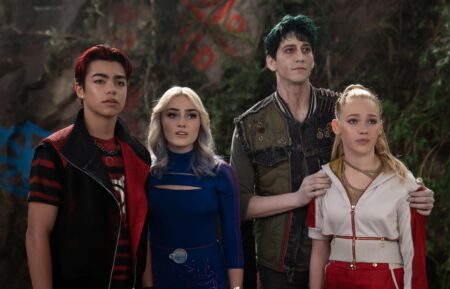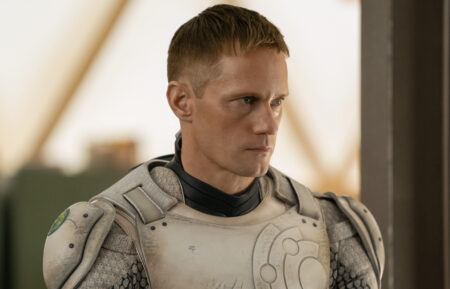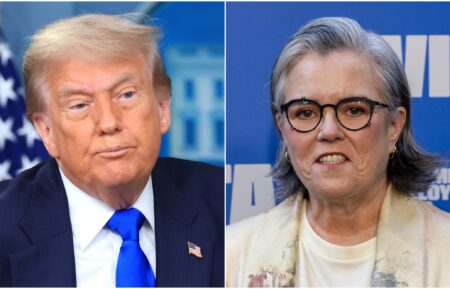‘Crashing’ Star Jamie Lee Breaks Down Ali’s #MeToo Moment in ‘MC, Middle, Headliner’
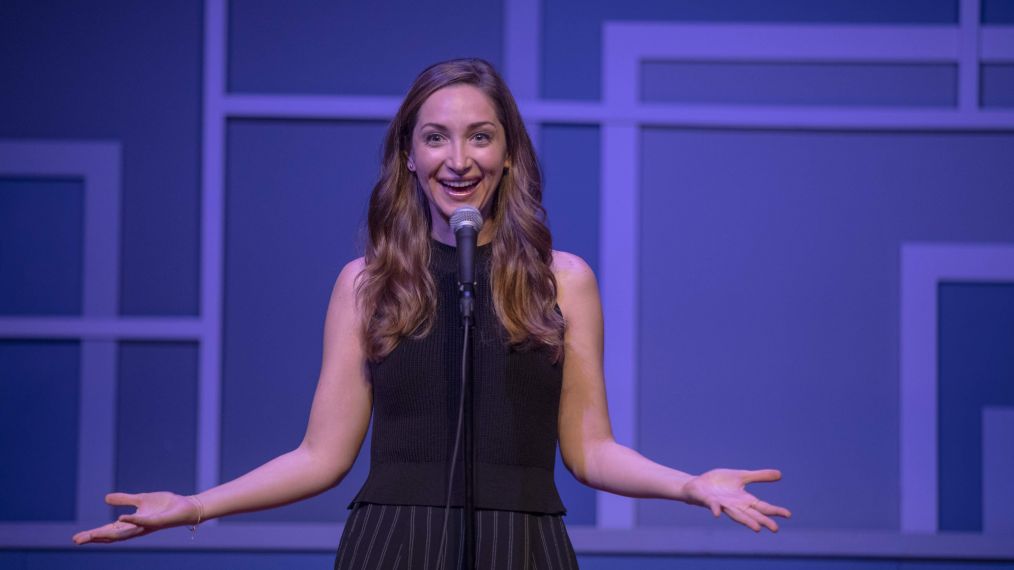
Q&A
[Warning: The below contains spoilers for the Season 3 episode of Crashing, titled “MC, Middle, Headliner.”]
Season 2 of Pete Holmes’s semi-autobiographical HBO comedy Crashing ended with his character, naive comic Pete dumping his girlfriend, Ali (Jamie Lee), on the street after her own stand-up set got a little too personal for his taste. Since then, however, things seem to be looking up for Ali. She’s got a cute new boyfriend, she’s booking gigs at New York’s legendary Comedy Cellar, and she’s even got a set coming up on The Late Show with Seth Meyers.
Still, the world of stand-up can be rough for women. This week’s episode find Ali performing at a comedy club in New Jersey alongside Pete and raunchy, loudmouth comic Jason (Dov Davidoff). Things get flesh-crawlingly uncomfortable when Jason’s set crosses the line into blatant misogyny.
Earlier this week, TV Insider got to chat with Jamie Lee about where she thinks that line actually is and how her own experience as a woman in comedy influenced Crashing’s #MeToo moment.
Tell me about how and why Pete and the other writers wanted to address #MeToo this season.
Jamie Lee: I think it actually happened in a pretty organic way. This episode, in its early stages, was about Pete and Jason, Dov Davidoff’s character, going on the road together and how Dov is kind of in this defeated place, but he doesn’t have any sort of self-awareness, so it comes out sort of in this very toxically, masculine way. And then from there, we decided, well, wouldn’t it be even juicier, and wouldn’t there be more of an opportunity for commentary as we explore the way that Jason’s character made a female comedian feel and also the comedy club waitress. So, that’s how we stumbled into realizing the potential relevance for this episode.
The episode is written by Dave King, Mike Lawrence and Pete, but you’re also a writer on this show. How much input do you have into Ali’s perspective here?
I definitely sat down with Mike Lawrence—and also Solomon Georgio helped a little as well. They were kind of the New York writing team. So, I definitely sat down with them to work on Ali’s dialogue and to give my opinion on the way the episode should unfold, but also to make sure that the authenticity was there for what it is like for a female comedian, like myself, to be in a situation like this. Granted I’ve never been in this exact situation, but this episode definitely did feel near and dear to me in a couple of different ways.
So, I went into this episode knowing that is was going to deal in some way with #MeToo issues, and I have to say, the fact that Ali was staying in a condo alone with two dudes made me really anxious about where this was all going.
Yeah! That’s a fair feeling. I think what we were trying to highlight is—from Ali’s perspective, this is an uncomfortable situation. Not only is she staying in a comedy condo—which, even if no one else is there, that is not a comfortable hospitality experience. But then to couple it with your ex-boyfriend who’s staying there and then this pretty blatant, misogynist, insecure guy is also there—It’s weird because she almost takes comfort from Pete in this episode, which is not comfortable for her. It’s not comfortable to be like hanging out with your ex-boyfriend given the circumstances. She’s kind of trapped in this weird part of New Jersey alone. He is the friendlier face in this situation.
Why take the characters out of their usual context for this? The episode deals with harassment and misogyny, but not in the Pete and Ali’s usual setting, in their community of comic in New York.
I think it is in the context of their community, even though it’s not happening necessarily at The Comedy Cellar or a show in New York City. Going on the road is very much a part of doing stand-up. I think that in a way, it’s better that it’s happening on the road because I do think that there is a level of isolation that you can’t avoid when you’re doing stand-up outside of the city. It’s not as social. It’s a lot of hanging out in the condo or the hotel. If you’re with people you know it can be a lot better. It just happens to be like this weird mix of Ali’s personal life, her professional life. She’s kinda there just to do her job and this other guy is there. And I think that is pretty realistic. You don’t get to choose who you work with when you’re at the level that these characters are at.
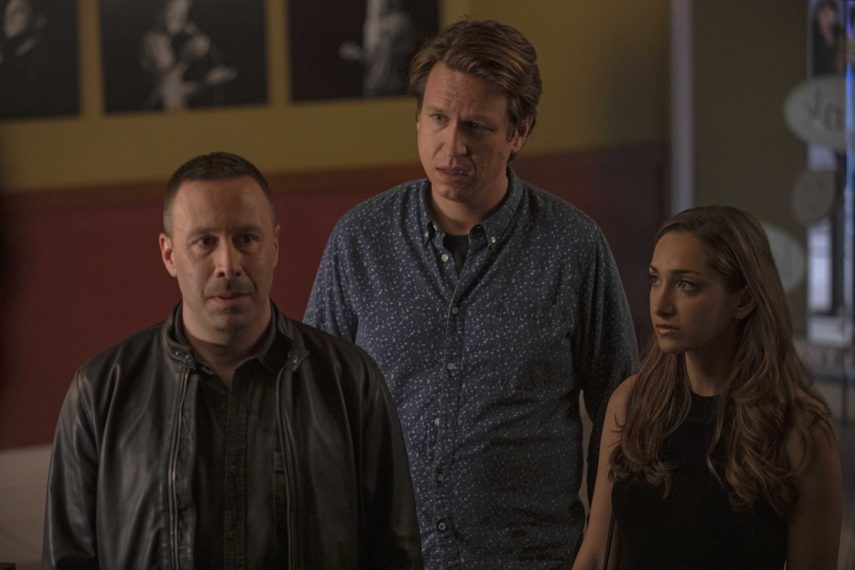
How did Dov Davidoff feel about having to kind of embody this despicable person?
Dov is such a deeply intelligent, intuitive actor, that I think the stand-up portion is really difficult, only because he’s clearly not doing his act. And I think that he totally nails it and did such a beautiful job and I think that that’s an especially challenging part of this show. There’s the acting component, but also when you get on stage with a microphone, you’re not necessarily doing the act that is 100-percent authentically you. I think that as comedians, when you get onstage, you switch into a mode, like “Oh, it’s time for me to be me.” But I think for the actors on this show, there’s an added level of challenge that we have to perform stand-up, but we’re not fully ourselves.
And on this show there’s often such a mix of characters who are based on the people playing them, people appearing as versions of themselves and just fictional characters.
Yeah, and I think in Dov’s case, he’s very much a caricature and a character. That is not representative of his stand-up or personality at all. It just goes to show how much of a talent he is.
Judd Apatow has spoken about the line in comedy between what’s transgressive and what’s offensive and I’m curious to get your perspective on that.
I think you know it in the moment you see it. I don’t think it really can be put into words, but I think it’s pretty clear when you’re watching something and it’s coming from a place that just doesn’t feel good versus a place that’s exploring themes that might be controversial in an interesting, genuinely curious way. I know that’s sort of a simple way to look at it. But I think you just know. I don’t consider myself to be easily offended. I’ve been in comedy and I do comedy and I’m not someone who wants to police comedy, but I have seen sets where I’m like, “Oh…that shouldn’t be like that.”
To me, I think it’s useful to think about why people laugh at certain things. Do they think a joke is funny for problematic reason? Then maybe the joke is offensive.
I mean obviously people with different experiences are gonna find different things funny. I think there’s a responsibility of the comedian to do a check in with themselves and see if they’re writing jokes from an exploratory place…and it’s really not coming from a hateful place, it’s trying to sort of make an observation that makes other people less alone because they’ve thought about it themselves. I don’t think there really is some sort of catch all approach to censoring comedy that’s healthy.
I think comedians are kind of expected to have their finger on the pulse of conversations that maybe not everybody is having but everybody should have. And when a comedian says something and it feels like, “Oh you don’t have your finger on the pulse, like the rest of us,” it’s almost just embarrassing to watch.
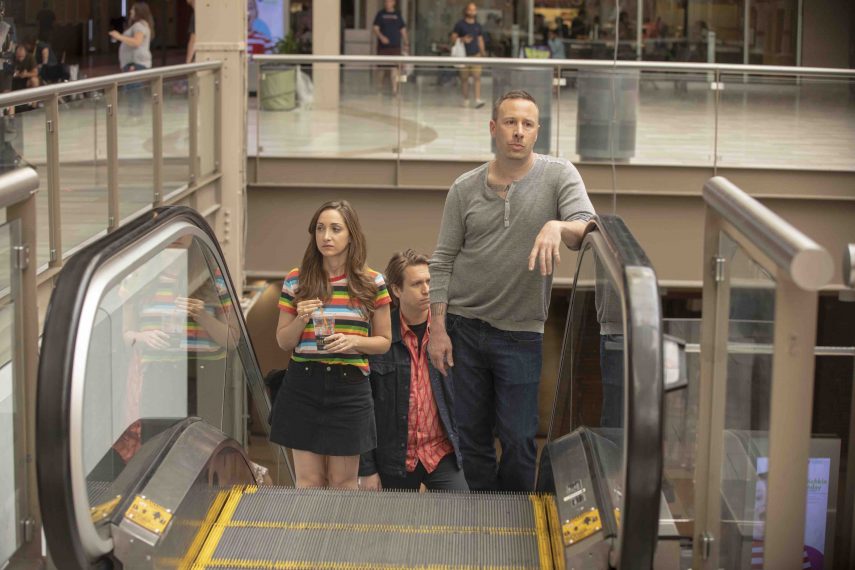
People must ask you about this stuff a lot because you’re a woman in comedy. Does that get annoying?
I don’t know if it’s annoying, I just think we’re in a tricky spot. Not talking about it gives it power and talking about it give its power. So, it feels pretty lose-lose to me either way, which is why I am happy to talk about it, but I’m also thrilled to not talk about it. I just don’t want the conversation to die. When I do interviews, at least I’m keeping it going. I’m like keeping the flame burning. And I just hope it doesn’t fizzle out because I do think that slowly we are making progress by acknowledging and trying to change it.
Ok, so back to Crashing: Is Ali Pete’s Mr. Big?
Ooooh! The fact that you’re even comparing us to Sex and the City is the biggest honor because that is my favorite show of all time. I mean, I’m not gonna say anything, but the rest of the season, stuff gets juicy. So, you should watch.
As a writer on the show and as the person who plays Pete’s ex-girlfriend, did you have much input into creating his new girlfriend Kat?
I think that it is based on a relationship that he did have at one point. And I think that was our jumping off point for the character. And then from there we just tried to make sure she had a complexity and a relatability. We thought it was interesting for Pete’s character to come off of the heels of a comedy relationship and then go back into dating someone who’s not in comedy. The way that they relate to each other is very different from the way that Pete and Ali relate to each other. There is a lot of stuff that’s really positive and there is a lot of stuff that’s negative.
Crashing, Sundays, 10/9c, HBO






